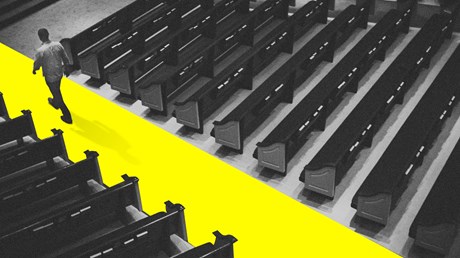They could foster the worst in evangelical spirituality. But the best of it, too.

“Every head bowed and every eye closed.” If you recognize those words, you probably grew up in a church much like the one I did, where every worship service ended with an altar call or an invitation hymn. The pianist or organist played “Just As I Am” or “Softly and Tenderly” while those wanting to profess faith in Christ, rededicate their lives, or seek prayer could slip out of their pews and walk down the aisle to the front of the sanctuary.
The altar call is out of step with almost every sector of American Christianity right now, and it’s easy to see why. After all, an altar call can, at its worst, represent our key vulnerabilities as evangelicals, such as the confusion of an emotional experience with the gospel. How many nominal Christians in America, with hearts just as once-born as ever, have reassured themselves that they “prayed the sinner’s prayer”?
These practices also can appeal to our weakness for the quest of bigness, with pastors judged each week by how many people went forward. And an altar call can represent our tendency to be drawn toward novelty and away from the history and liturgy of the church.
Growing up, I almost assumed that altar calls were happening at the Council of Nicaea, or that Augustine of Hippo filled out a card noting his profession of faith (though he kind of did). I was a bit startled to learn that the invitation hymn the way I knew it—though rooted in older forms of revivalism—was mostly influenced by the Billy Graham crusades of the startlingly recent mid-20th century.
And yet.
In this publication a generation ago, historian Martin Marty argued that evangelical churches of that day were growing at least in part because ...
from Christianity Today Magazine
Umn ministry


.gif)

.gif)
.gif)
